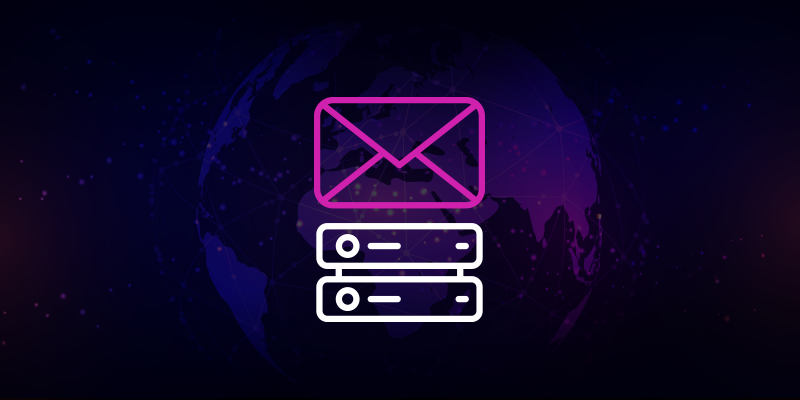Updated: March 11, 2024
Important emails are, well, important. And you want to receive them safely and on time. Enter: email servers. This article will cover what an email server is, how it works, and why it matters to you. We’ll also talk about Axigen’s mail server features and how they keep you and your business protected.

What Is an Email Server? Let’s Analyze the Definition
An email server, also called a mail server, is essentially a computer system that sends and receives emails. When you send an email, it goes through a series of servers to reach its final destination. While this process is lightning fast and efficient (thanks, technology!), there is a significant amount of complexity behind sending and receiving emails.
Email communication involves complex protocols and processes. Usually, the email server is a computer or machine that has a complete system with different applications or services. Based on the type of action they perform, email servers can be categorized into incoming and outgoing email servers.
In the early days of the internet, during the Web1 phase, email senders had to rely on their own servers. This led to the most widely-known email platforms that operate on private servers. The shift increased the accessibility of email, but reduced its security (think how many data breaches Google, Yahoo, and others have suffered).
Today, anyone can still host their own server to effectively dodge any concerns related to security and privacy on big email providers. And Axigen was designed to help everyone to do just that.
How Does An Email Server Work?

For a computer system to function as a mail server, it must have mail server software installed. This software then allows the system administrator to manage and create email accounts for any of the domains hosted on the server.
Alongside that, you have protocols. Protocols are networking-software rules that allow computers to connect to networks everywhere so you may shop online, send emails, and browse the internet freely. These protocols are a vital component of your networking activity.
SMTP
The SMTP protocol handles any outgoing mail requests and sends emails. So SMTP is short for Simple Mail Transfer Protocol and is the outgoing mail server. We can think of SMTP as moving your email on and across networks. Without it, your emails wouldn’t go anywhere.
POP / IMAP
For incoming mail servers, there are two main varieties — POP3 and IMAP. POP3 servers, short for Post Office Protocol version 3, are best known for fetching the content of the Inbox on your computer’s hard drive. IMAP servers, short for Internet Message Access Protocol, are used for o way synchronization of the entire mailbox.
IMAP can also function as a mail server’s alternate protocol retrieval program. And although there are newer POP versions, which offer more features, the preferred protocol remains POP3 because it’s simple, has a high rate of success, and gets the job done with a minimum of errors. It even allows you to download your emails and read them while offline.
Without one of these protocols working correctly, your email would not reach your computer.
How to Choose Between POP3 and IMAP
Choosing between POP3 and IMAP depends on how you or your users — if you are running an email server — access emails.
POP3 is best for accessing emails from a single device, since it downloads emails and often deletes them from the server after download, saving server space but limiting access to those emails to the device they were downloaded to.
IMAP, on the other hand, keeps emails on the server, allowing the access and synchronization of messages across multiple devices. The trade-off is that IMAP requires more server space to store all emails and can be slower if many emails are stored.
What Is the Purpose of an Email Server?
At its simplest, a mail server collects and distributes emails to their intended destination. You can think of it as a computer that acts as an electronic post office for email, which allows you to control the transfer of emails within a network through different protocols.
A mail server can also encrypt the transfer of emails, so nobody can gain access to the information in your personal email inbox. Today’s mailboxes can include a treasure-trove of sensitive information from social media details to financial data that hackers are eager to sell. So it’s more important than ever to secure your emails. To do just that, some email servers and server software can also provide additional security features to guard against cybersecurity attacks.
Whether you’re checking your emails from your phone, at work, on the web, or by using a software solution, your email is handled by both incoming and outgoing email servers. Without this well-oiled machine of protocols and server software, you wouldn’t receive all of your important messages or time-sensitive emails. Additionally, problems with your incoming mail server may present challenges for your emails coming in on time or at all.
Email Server Add-ons — What More Can You Do with an Email Server?
As we mentioned earlier, sending and receiving emails is a complicated process that increases in complexity with every new regulation and security requirement. And yet, even with all the evolving security standards, your messages can still be falsified or forged, putting you at risk for cyber attacks. Since email is the main target for these attacks, you need to provide extra email protection, especially as a business.
Mail server software is available for a multitude of platforms. Whether you’re looking to establish a business or just looking to increase your security or IT infrastructure, the email server software can offer a more secure environment specifically designed to cater to your needs, in comparison to traditional email providers, for example. And thankfully, there are options to secure your mail server.
Besides extensive security tools,
- access from anywhere anytime is crucial,
- upgrading to more users or features,
- calendaring and collaboration to allow sharing of calendars and public folders,
and much, much more are all very useful features.
You get all of these with Axigen’s mail server.
The Axigen Email Server
Full-featured Calendaring & Collaboration Tool You Can Try out for Free
Axigen’s high-performance mail server technology is built specifically to provide a secure and fast email transfer, processing, and delivery. Many people don’t make the switch for fear of losing access to their personal email. With Axigen, you can toss that fear out! You have the possibility of retrieving messages from your external accounts (Gmail, Yahoo!).
Additionally, Axigen offers a full fleet of online support resources. Our mail server is a one-stop-shop for all your email needs, with up to five domains included. If you’re a business owner, you can consider one of our pricing plans or click the link below to...